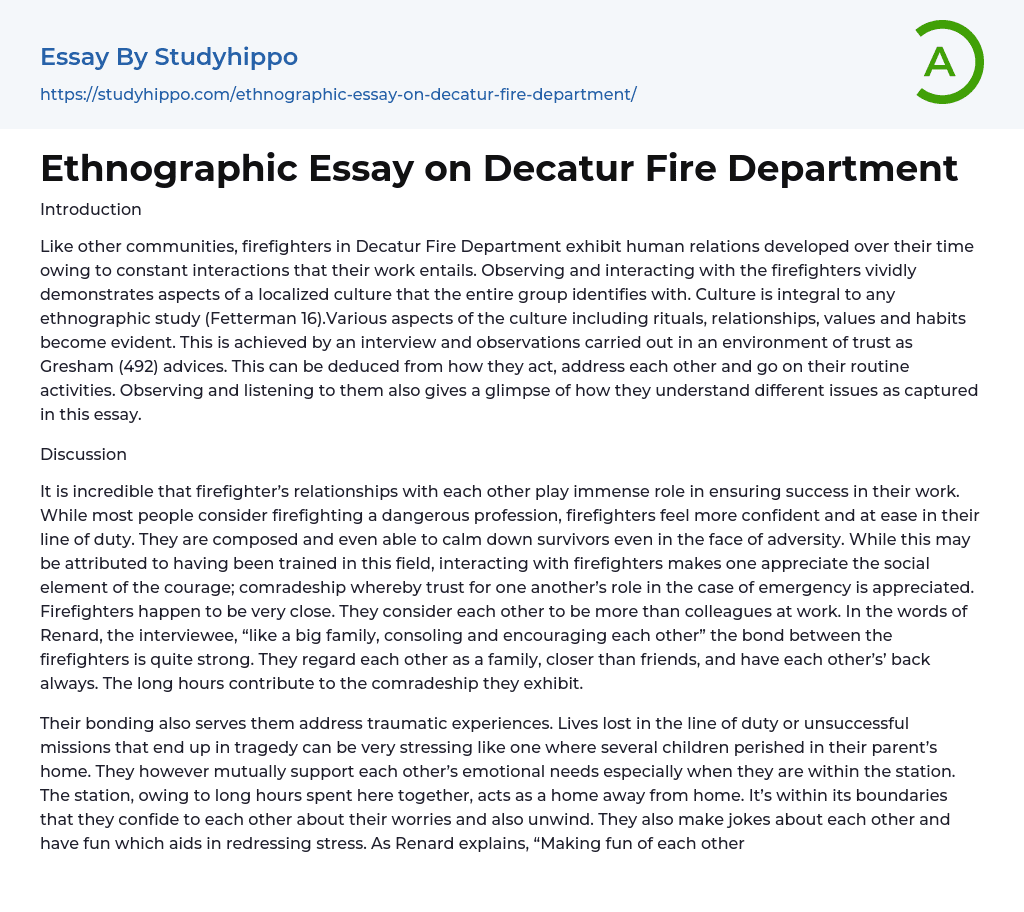Introduction
Like other communities, firefighters in Decatur Fire Department exhibit human relations developed over their time owing to constant interactions that their work entails. Observing and interacting with the firefighters vividly demonstrates aspects of a localized culture that the entire group identifies with. Culture is integral to any ethnographic study (Fetterman 16).Various aspects of the culture including rituals, relationships, values and habits become evident. This is achieved by an interview and observations carried out in an environment of trust as Gresham (492) advices. This can be deduced from how they act, address each other and go on their routine activities. Observing and listening to them also gives a glimpse of how they understand different issues as captured in this essay.
Discussion
It is incredible that firefighter’s relationships with each other pl
...ay immense role in ensuring success in their work. While most people consider firefighting a dangerous profession, firefighters feel more confident and at ease in their line of duty. They are composed and even able to calm down survivors even in the face of adversity. While this may be attributed to having been trained in this field, interacting with firefighters makes one appreciate the social element of the courage; comradeship whereby trust for one another’s role in the case of emergency is appreciated. Firefighters happen to be very close. They consider each other to be more than colleagues at work. In the words of Renard, the interviewee, “like a big family, consoling and encouraging each other” the bond between the firefighters is quite strong. They regard each other as a family, closer than friends, and have each other’s’ back always. The long hours contribute to the comradeship they
exhibit.
Their bonding also serves them address traumatic experiences. Lives lost in the line of duty or unsuccessful missions that end up in tragedy can be very stressing like one where several children perished in their parent’s home. They however mutually support each other’s emotional needs especially when they are within the station. The station, owing to long hours spent here together, acts as a home away from home. It’s within its boundaries that they confide to each other about their worries and also unwind. They also make jokes about each other and have fun which aids in redressing stress. As Renard explains, “Making fun of each other also helps handle stress.” They advise and counsel each other; the most experienced ones are especially crucial for this. As a homely place, they feel safe and at peace from the chaos and bustles of their work outside the station.
Notably, firefighters operate with a great degree of motivation, extreme challenges of the career notwithstanding. Considering that they are not as highly paid, it is certain that the pay is not the most important source of motivation to pursue such a career considered very risky by a majority of the public. Often, firefighter’s initiatives are underfunded by the governments. They also spend limited time with their families for the sake of their work. Nevertheless, firefighters passionately carry out their duties; saving lives and property. Actually, they do not do it for the heroism associated with such work. Firefighters consider it both fulfilling and rewarding to be selfless. Renard refers to it as “A duty to assist people in need!” The desire to do good for others is one major
source of motivation cited by the firefighter. A thank you from a grateful accident survivor or someone who almost lost property is a reward enough.
Firefighters exhibit a high degree of coordination. Even in times of urgency which occur quite often, composure reigns. Everyone is perfectly ready for their assigned roles. Their comradeship bears strong trust such that even in extremely risky circumstances, a firefighter is confident the teammates will never compromise his safety. They prefer to view and understand themselves as a singular entity, bound together by a passion for helping others which creates a strong identity. Weedon (6) reiterates that identity comes with a sense of belonging. While protocol and respect are important in dealing with each other, communication is efficient and uninhibited.
Conclusion
Contrary to popular beliefs, the fire station is a very busy place. When not responding to emergencies, the firefighters are involved in various activities like training, cleaning, and others. These activities, while they are aimed at enhancing preparedness for the sake of community’s welfare, they tremendously impact how the firefighters relate to each other. In the long run, a very closely knit group of individuals is formed that is bound, not necessarily by duties, but by friendship.
Works Cited
- Fetterman, David M. Ethnography: Step-by-step. Los Angeles: SAGE, 2010. Print.
- Gresham, Ruth. "Trusting Relationships: A Key For Cross-Cultural Engagement." Journal Of Higher Education Policy & Management 34.5 (2012): 491-501.Academic Search Premier. Web. 9 Oct. 2016.
- Weedon, Chris. Identity and Culture. Maidenhead: Open University Press, 2004. Internet resource.
- Adaptation essays
- Adventure essays
- Adversity essays
- Aging essays
- Alcohol essays
- Barbie Doll essays
- Beauty essays
- Care essays
- Carpe diem essays
- Change essays
- Chess essays
- Chicken essays
- Choices essays
- Contrast essays
- Crops essays
- Development essays
- Dream essays
- Evil essays
- Experience essays
- Family essays
- Farm essays
- Fire essays
- First Love essays
- Focus essays
- Greed essays
- Hero essays
- Holiday essays
- House essays
- Housing essays
- Humility essays
- Humor essays
- Hypocrisy essays
- Integrity essays
- Law of Life essays
- Life Changing Experience essays
- Life Experience essays
- Lifestyle essays
- Limitations essays
- Love Story essays
- Mother Tongue essays
- Motherhood essays
- My Neighborhood essays
- Myself essays
- Mystery essays
- Narcissism essays
- Never Give Up essays
- Nursing essays
- Object essays
- Opportunity essays
- Peel essays




